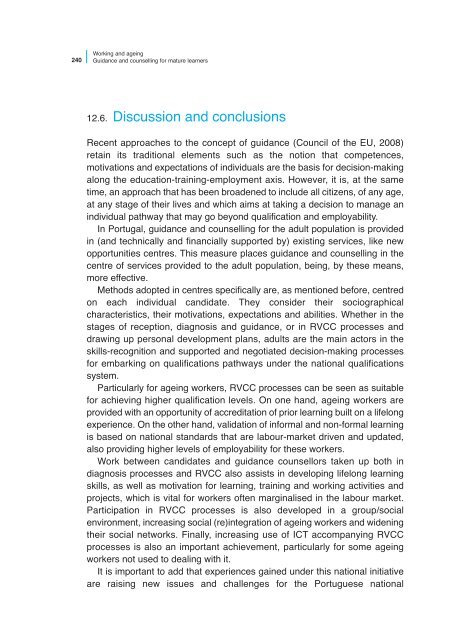Working and ageing - Cedefop - Europa
Working and ageing - Cedefop - Europa
Working and ageing - Cedefop - Europa
You also want an ePaper? Increase the reach of your titles
YUMPU automatically turns print PDFs into web optimized ePapers that Google loves.
240<br />
<strong>Working</strong> <strong>and</strong> <strong>ageing</strong><br />
Guidance <strong>and</strong> counselling for mature learners<br />
12.6. Discussion <strong>and</strong> conclusions<br />
Recent approaches to the concept of guidance (Council of the EU, 2008)<br />
retain its traditional elements such as the notion that competences,<br />
motivations <strong>and</strong> expectations of individuals are the basis for decision-making<br />
along the education-training-employment axis. However, it is, at the same<br />
time, an approach that has been broadened to include all citizens, of any age,<br />
at any stage of their lives <strong>and</strong> which aims at taking a decision to manage an<br />
individual pathway that may go beyond qualification <strong>and</strong> employability.<br />
In Portugal, guidance <strong>and</strong> counselling for the adult population is provided<br />
in (<strong>and</strong> technically <strong>and</strong> financially supported by) existing services, like new<br />
opportunities centres. This measure places guidance <strong>and</strong> counselling in the<br />
centre of services provided to the adult population, being, by these means,<br />
more effective.<br />
Methods adopted in centres specifically are, as mentioned before, centred<br />
on each individual c<strong>and</strong>idate. They consider their sociographical<br />
characteristics, their motivations, expectations <strong>and</strong> abilities. Whether in the<br />
stages of reception, diagnosis <strong>and</strong> guidance, or in RVCC processes <strong>and</strong><br />
drawing up personal development plans, adults are the main actors in the<br />
skills-recognition <strong>and</strong> supported <strong>and</strong> negotiated decision-making processes<br />
for embarking on qualifications pathways under the national qualifications<br />
system.<br />
Particularly for <strong>ageing</strong> workers, RVCC processes can be seen as suitable<br />
for achieving higher qualification levels. On one h<strong>and</strong>, <strong>ageing</strong> workers are<br />
provided with an opportunity of accreditation of prior learning built on a lifelong<br />
experience. On the other h<strong>and</strong>, validation of informal <strong>and</strong> non-formal learning<br />
is based on national st<strong>and</strong>ards that are labour-market driven <strong>and</strong> updated,<br />
also providing higher levels of employability for these workers.<br />
Work between c<strong>and</strong>idates <strong>and</strong> guidance counsellors taken up both in<br />
diagnosis processes <strong>and</strong> RVCC also assists in developing lifelong learning<br />
skills, as well as motivation for learning, training <strong>and</strong> working activities <strong>and</strong><br />
projects, which is vital for workers often marginalised in the labour market.<br />
Participation in RVCC processes is also developed in a group/social<br />
environment, increasing social (re)integration of <strong>ageing</strong> workers <strong>and</strong> widening<br />
their social networks. Finally, increasing use of ICT accompanying RVCC<br />
processes is also an important achievement, particularly for some <strong>ageing</strong><br />
workers not used to dealing with it.<br />
It is important to add that experiences gained under this national initiative<br />
are raising new issues <strong>and</strong> challenges for the Portuguese national

















